Edie Melson's Blog, page 206
March 18, 2020
Improve Your Book’s Amazon Rank
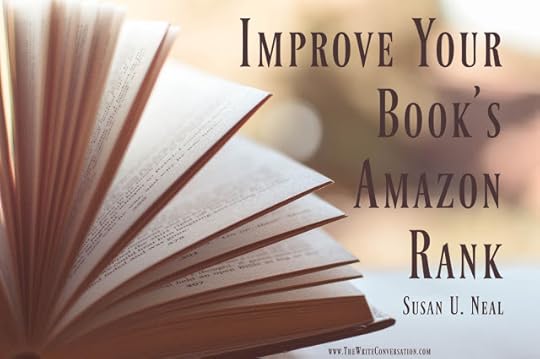
by Susan U. Neal RN, MBA, MHS @SusanNealYoga
Is your book selling as well as you would like? How would you like to attain a higher Amazon rank? This article will describe techniques to boost your book’s rank by adding book categories and strengthening keywords. It takes a little work, but the results can be exceptional.CategoriesTypically, your book is placed in three Amazon categories. Amazon uses categories to rank books. Did you know that you can put your book in ten Amazon categories? The trick is that you have to call Amazon or email them with the additional applicable categories for your book. You communicate with Amazon through authorcentral.Amazon.com.
If you self-published, you can contact Amazon to add categories. If your book is traditionally published, you would need to ask your publisher to do this.
If you strategically choose additional categories with less competition, your book ranking could increase. When I added seven more categories to my book 7 Steps To Get Off Sugar and Carbohydrates it went from number ninety-eight in the diet category to number one in the healthy diet category. Healthy diet is a more specific category with fewer competitive books. All it took was one phone call to get my book ranked as a number one Amazon best-seller. When your book ranks number one, Amazon posts a best-seller sticker next to it. Now that is advertising at its best, and it is free! Since I added additional categories, all seven of my books are listed in the top one hundred books for at least one category.
Figuring out the categories can be challenging as there are thousands of book categories for both e-books and print books. Therefore, I purchased the software program Publisher Rocket which identifies the best keywords and categories for your book. If you want to be strategic and sell more books, this software is indispensable. When choosing categories, be sure that they match the content in your book. Categories are similar to genres.
KeywordsThe second tactic to increase your Amazon ranking is by strengthening your book’s keywords. Amazon allows you to list seven keywords for each eBook and print book. That’s fourteen keywords not just seven. Strengthen your keywords through using Publisher Rocket. This software tells you how many Amazon searches are performed per month for each keyword so that you can select the keywords with the most searches.
For my newest release, Solving the Gluten Puzzle , over 18,000 monthly searches are performed for the fourteen keywords I chose for this book. I added the keywords to the detail section of my book in Kindle Direct Publishing. Since I added additional categories, this book is now ranking number thirteen in Irritable Bowel Syndrome and number sixty-two in gluten-free diets.
After you figure out your additional categories and more robust keywords, it is time to update your Amazon book description. Amazon needs more information about your book to get it into the appropriate readers’ hands. So add your new keywords to the description and include any awards your book received.
If you are self-published, I recommend purchasing Publisher Rocket and selecting additional book categories and keywords for each of your books. Add more robust keywords to your book’s description, make that phone call to Amazon, and watch your book’s ranking soar.
TWEETABLEImprove Your Book’s Amazon Rank - tips from @SusanNealYoga on @EdieMelson (Click to Tweet)
 Susan U. Neal, RN, MBA, MHSSusan’s mission is to improve the health of the body of Christ. She has her RN and MBA degrees, as well as a master’s in health science. She is a CERTIFIED HEALTH AND WELLNESS COACH with the American Association of Christian Counselors. She published five books, the Selah award winner 7 STEPS TO GET OFF SUGAR AND CARBOHYDRATES, CHRISTIAN STUDY GUIDE FOR 7 STEPS TO GET OFF SUGAR AND CARBOHYDRATES, HEALTHY LIVING JOURNAL, SCRIPTURE YOGA a #1 Amazon best-selling yoga book, and YOGA FOR BEGINNERS which ranked #3. She published two sets of Christian Yoga Card Decks and two Christian Yoga DVDs that are available at CHRISTINAYOGA.COM. Her digital product HOW TO PREVENT, IMPROVE, AND REVERSE ALZHEIMER’S AND DEMENTIA is a great resource. To learn more about Susan visit her website SUSANUNEAL.COM You can also connect with Susan on FACEBOOK, TWITTER, and INSTAGRAM.
Susan U. Neal, RN, MBA, MHSSusan’s mission is to improve the health of the body of Christ. She has her RN and MBA degrees, as well as a master’s in health science. She is a CERTIFIED HEALTH AND WELLNESS COACH with the American Association of Christian Counselors. She published five books, the Selah award winner 7 STEPS TO GET OFF SUGAR AND CARBOHYDRATES, CHRISTIAN STUDY GUIDE FOR 7 STEPS TO GET OFF SUGAR AND CARBOHYDRATES, HEALTHY LIVING JOURNAL, SCRIPTURE YOGA a #1 Amazon best-selling yoga book, and YOGA FOR BEGINNERS which ranked #3. She published two sets of Christian Yoga Card Decks and two Christian Yoga DVDs that are available at CHRISTINAYOGA.COM. Her digital product HOW TO PREVENT, IMPROVE, AND REVERSE ALZHEIMER’S AND DEMENTIA is a great resource. To learn more about Susan visit her website SUSANUNEAL.COM You can also connect with Susan on FACEBOOK, TWITTER, and INSTAGRAM.
Published on March 18, 2020 22:00
March 17, 2020
10 Tips for Quoting Scripture in Your Writing

by Katy Kauffman @KatyKauffman28
There’s study mode, and then there’s writing mode. When we’re jotting down Bible verses in our spiritual journals, we normally don’t think about writing down the Bible translation. Or where the quotation marks go. Or if a period should be before the reference or after it. We’re in study mode, fixated on a verse’s beauty or power, and rightfully so. But when we quote Scripture in our writing, it’s not just about getting the words right, but remembering the correct formatting. Not because we’re legalistic or the punctuation police will come after us, but so we can help our readers. And our editors.When we format our Bible citations correctly, we help our readers to appreciate Scripture more. They will be able to look up a verse on their own in the translation we’ve used and enjoy it longer. It’s in many of these moments that I hear something special from God as I meditate on a verse an author has shared.
Also, when we remember the rules for citing Scripture, we make our writing less cluttered. Our punctuation won’t cause any distractions for our readers, some of whom may be our future editors. Some editors may want to use our work, but they don’t have the time (or manpower) to edit everything that is submitted. The more we can do on our own to prepare our writing for publication, the better chance we will have to be published and bless people’s hearts.
So when you quote Scripture, keep these formatting and citation tips in mind.1 They will make things easier on your editors and smoother for your readers.
10 Tips for Quoting ScriptionAlways, always, always give the Bible translation for the verses you quote. (Even on memes!)In running text (i.e., paragraph form), cite a Bible reference in the following way: “God is love” (1 John 4:8 NKJV). Notice there’s no comma within the parentheses, and the period goes after the ending parenthesis.If your Bible verse is longer than three or four lines, make it a block quote (all lines are indented on the left), and put the period at the end of the verse, so that it looks like this—“have everlasting life.” (John 3:16 NKJV)If you’re writing a book and using one translation most of the time, you can put a note on the copyright page and not mention the translation every time you use it. Look inside the Bible to see what language to use for the copyright information. For instance, our publishing company used the following note in one of our books: “Unless otherwise indicated, all Scripture references are taken from the New King James Version. Copyright © 1979, 1980, 1982 by Thomas Nelson, Inc. Used by permission. All rights reserved.” Some editors (like me) may allow you to mention the Bible translation once in an article or a devotion. When a translation is used often in an article, I put an asterisk after the first reference, like the following: “God is love” (1 John 4:8 NKJV*). Then at the end of the article, I make this note—“*All Scripture verses are taken from the NKJV unless otherwise noted.” If only one version is used, then I omit the “unless” phrase.On your book’s copyright page, remember to provide the correct copyright information for every Bible translation you have used. Look on the copyright page of your Bible translation to see how much of that version can be quoted without permission.In your writing, use quotation marks or italics to quote Scripture, but please don’t use both (unless someone is talking in part of the verse). Your publisher may suggest which to use, but whichever you pick, remember to be consistent. Please be sure to double-check the wording of Bible verses you quote (sometimes we remember them differently than a translation states them), and double-check the punctuation.If you start quoting in the middle of a verse, you don’t have to put an ellipsis at the beginning of the quote. If you leave off the end of a verse, you don’t have to use an ellipsis to show that. But do use it to show something has been left out of the middle of a verse, and remember to put a space on either side of the ellipsis.
At this point, you may think, Nope, I just wanted to quote Scripture. I’m with you. It can be a lot to remember. Or these may be things you’ve been practicing for years. Once I understood the rules, these tips became second nature, and it was easier to honor the wonderful, sacred text that Scripture is.
What Bible translation do you use the most, and were any of these tips new to you? I’d like to read your comments below, so be sure to join the conversation!
1 Note: These tips are taken from The Chicago Manual of Style.
TWEETABLE10 Tips for Quoting Scripture in Your Writing - @KatyKauffman28 on @EdieMelson (Click to Tweet)
 Katy Kauffman is an award-winning author, an editor of
Refresh Bible Study Magazine
, and a co-founder of Lighthouse Bible Studies. She loves connecting with writers and working alongside them in compilations, such as Feed Your Soul with the Word of God, Collection 1 which is a 2020 Selah Awards finalist. Lighthouse’s newest compilation, The Power to Make a Difference, released January 2020.
Katy Kauffman is an award-winning author, an editor of
Refresh Bible Study Magazine
, and a co-founder of Lighthouse Bible Studies. She loves connecting with writers and working alongside them in compilations, such as Feed Your Soul with the Word of God, Collection 1 which is a 2020 Selah Awards finalist. Lighthouse’s newest compilation, The Power to Make a Difference, released January 2020. In addition to online magazines, Katy’s writing can be found at CBN.com, thoughts-about-God.com, the Arise Daily blog, and two blogs on writing. She loves spending time with family and friends, making jewelry, and hunting for the best donuts. Connect with her at her blog, The Scrapbooked Bible Study , and on Facebook and Twitter.
Published on March 17, 2020 22:00
March 16, 2020
5 Tips for When You Are Discouraged in Your Call to Write

by Lucinda Secrest McDowell @LucindaSMcDowel
You got excited. Inspired to write. Motivated to minister. Challenged to pursue dreams.
And, for a while there—surrounded by kindred spirits cheering you on—you could almost taste the success. A book published. A conference keynote scheduled. A popular blog.
But now. Now you live in reality. Of words that won’t come. At least not in the right order. Of emails that say your social media numbers aren’t high enough. Of family and friends who still treat your holy calling as a mere hobby. What’s a writer to do? 1. Reflect and Review. Ask yourself the hard questions: Why am I writing? What is my unique message? When and how did I confirm God’s calling to share my story? Who are those who have encouraged and challenged me to do this – and what did they say? What scripture has spoken directly to me as I have sought to pursue writing and speaking? Which biblical character do I most identify with on this journey and what can I learn from them? Then take it all to your heavenly Father in prayer. Pray with surrender and supplication for guidance and provision. Be quiet and ask for peace deep in your soul over all things in the publishing industry which are causing fear, hesitation or confusion. God will meet you where you are. Open your hands. To both release and to receive.
2. Plan Strategically. What is your first step? An outline? A strategic blog? Chances are you have already begun to write and even gotten quite far along this path so far (submission to potential agents or editors, etc.) Still, it helps to write down the steps necessary to reach your goal. In doing so, you may just be reminded of something or someone you neglected to contact. Perhaps that writers conference workshop recording you haven’t listened to yet. Set realistic goals for each week of this fall and do your best to reach them.
3. Reach Out. No matter how engaged you are with readers (or potential readers and audience) you could always use more “friends and followers” right? This is just part of how our world operates today. It won’t help to bemoan the process of platform building. Think of it this way – an opportunity to get your vitally important message out to hurting people who need to hear Good News! So yes, you are going to have to reach out and “invite” people to “like” you. Yes, you will need to spend time online (when, I suspect, you would far rather be writing) engaging with others in the field. Just do it. 4. Gather. Writing is such a solitary profession that it is vital you make time to gather with others for learning, prayer and iron-sharpening-iron growth. Are you in a local writers’ group? Even if you can’t find someone geographically nearby, there are online groups. And I highly suggest making it a priority to attend a Writers Event every year if possible. There you will meet other like-minded creative souls just like you. They understand. They know what it takes and will encourage and pray for you.
5. Do the Next Thing. I hope the first four tips haven’t come across as demands, but more of suggestions. As always, I am writing this blog to myself first. Reminders of what I already know after a lifetime of writing and speaking. And yes, a lifetime of occasional times of discouragement in both areas. Still, I cannot tell YOU what God is asking of you at this moment. He may be saying “lay it down” for a season. He may be “kicking you in the pants” and urging courage and risk. But I do believe that as you and I make all our concerns a matter of prayer, God will guide us to the next thing. Spend some time listening and you will know what your Next Thing is. Then, by faith and in obedience, do it. God will then give you another next thing…
“Be strong and courageous and get to work. Don’t be frightened by the size of the task, for the Lord my God is with you; he will not forsake you. He will see to it that everything is finished correctly.” 1 Chronicles 28.20
Yes, I know today is St. Patrick’s Day. Click HERE for “Why I Celebrate Saint Patrick’s Day” and learn more than you could imagine about this amazing man – bonus, a good prayer for these times…
TWEETABLE5 Tips for When You Are Discouraged in Your Call to Write - @LucindaSMcDowel on @EdieMelson (Click to Tweet)
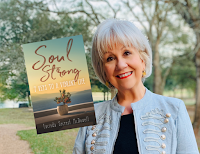 Lucinda Secrest McDowell, M.T.S., is a storyteller and seasoned mentor who engages both heart and mind while
“Helping you Choose a Life of Serenity & Strength.”
A graduate of Gordon-Conwell Theological Seminary and Furman University, McDowell is the author of 15 books and contributing author to 30+ books. Her award-winning books include
LIFE-GIVING CHOICES
,
SOUL STRONG
(2020),
DWELLING PLACES
(2017 Christian Retailing BEST Award for Devotional),
ORDINARY GRACES
(2018 Selah Finalist),
LIVE THESE WORDS
, and
Refresh!
Lucinda, a member of the REDBUD WRITERS GUILD, received Mt. Hermon “Writer of the Year” award and guest blogs for The Write Conversation, Blue Ridge Mountains Christian Writers Conference Blog and (in)courage. Whether co-directing
“RENEW ~ RETREAT FOR NEW ENGLAND WRITING,”
pouring into young mamas, or leading a restorative day of prayer, she is energized by investing in people of all ages. Lucinda’s favorites include tea parties, good books, laughing friends, ancient prayers, country music, cozy quilts, musical theatre, and especially her family scattered around the world doing amazing things. Known for her ability to convey deep truth in practical and winsome ways, she writes from “Sunnyside” cottage in New England and blogs weekly at
https://lucindasecrestmcdowell.com/
Follow Lucinda on Twitter: @LUCINDASMCDOWEL
Lucinda Secrest McDowell, M.T.S., is a storyteller and seasoned mentor who engages both heart and mind while
“Helping you Choose a Life of Serenity & Strength.”
A graduate of Gordon-Conwell Theological Seminary and Furman University, McDowell is the author of 15 books and contributing author to 30+ books. Her award-winning books include
LIFE-GIVING CHOICES
,
SOUL STRONG
(2020),
DWELLING PLACES
(2017 Christian Retailing BEST Award for Devotional),
ORDINARY GRACES
(2018 Selah Finalist),
LIVE THESE WORDS
, and
Refresh!
Lucinda, a member of the REDBUD WRITERS GUILD, received Mt. Hermon “Writer of the Year” award and guest blogs for The Write Conversation, Blue Ridge Mountains Christian Writers Conference Blog and (in)courage. Whether co-directing
“RENEW ~ RETREAT FOR NEW ENGLAND WRITING,”
pouring into young mamas, or leading a restorative day of prayer, she is energized by investing in people of all ages. Lucinda’s favorites include tea parties, good books, laughing friends, ancient prayers, country music, cozy quilts, musical theatre, and especially her family scattered around the world doing amazing things. Known for her ability to convey deep truth in practical and winsome ways, she writes from “Sunnyside” cottage in New England and blogs weekly at
https://lucindasecrestmcdowell.com/
Follow Lucinda on Twitter: @LUCINDASMCDOWEL
Published on March 16, 2020 22:00
March 15, 2020
Book Launch Tips for Authors

by Karen Whiting @KarenHWhiting
A book launch encompasses all the activity around the release of a book. The plans are as varied as authors and their titles. The following are two snapshots of single activities. One took a lot of planning and the other took a few minutes. They were both part of a larger plan.My most recent launch started with a FB live on release day where I spoke about my passion for the book. That had several hundred views and numerous shares. The book actually released as a hurricane approached that cancelled one big in-person event.
My friend Debbie W. Wilson had a book launch party recently. A friend offered to host it at her home. They sent out postcard invites and set up two times, afternoon and evening, to make it flexible. One friend made party favors related to the title. Another made refreshments. More than 30 women came that rainy day and Debbie sold more that 100 books.
Those activities helped kickoff the launch. Debbie also had articles published the week of the release plus specific pre-written posts stared to go live. I had a number of radio guest appearances, pre-written blog posts, and memes posted on social media during my release week. Our launch team members posted reviews the week of the release. Preparations started weel of the release date.
Get OrganizedIt takes effort and organization to produce a successful launch. I start with a spread sheet where I can list each type of desired promotion in rows and the contact information plus details in the columns. My spread sheet contains media, social media posts, memes, speaking, and articles with contact information and space to add links after any promo completed. A launch team section includes names and addresses of members and columns to check off things they do like reviews, sharing my posts, and spreading the news.
The worksheet helps me track and recall ideas. It also contains magazines, blogs, and pitch ideas. It may take months to get through all the ideas and contacts I list. That will keep the promotion going.
PrepareStart the launch early with these activities:As you edit your book, create memes and blog prompts/posts Ask people to join your launch tea, collect their information, and give them a list of how they can helpBuild a list of contacts for radio, television, podcasts, and blogsCreate tip sheets to give out free with great ideas readers will wantCreate freebies and crafts or party favors to make or buy
For my book 52 Weekly Devotions for Families Called to Serve , I created teddy bear necklace kits that included a note about the story in the book of firefighters giving teddy bears to children whose home had a fire. The kit includes directions, the book cover, and a link to watch a video demonstrating how to make it. The bears help encourages families (my readers) to appreciate firefighters and other people who serve us. It’s wearable to become a sharing tool for the book.
The images created (called memes) are another show and tell tool. Use them to make slides for a PPT presentation. The PPT can be used when you speak or can be turned into an online video where you add music or voice over the images. The video makes a great promo piece or book trailer. Great meme can also be used to create flyers and other print promotional materials.
Freebies Before the launch come up with some freebies such as greeting cards, pass it on postcards, favors, and tip sheets. These should inexpensive and easy to prepare. Gather supplies and start writing the tips while the book is in the editing/printing stage. Tip sheets that provide great ideas often get posted on refrigerators.
I often work with my publisher to create effective bookmarks that showcase reader benefits. Some print a quantity for me while others create the design and I get them printed.
Reach OutContact media with press releases and follow up with calls to see if the person is interested in interviewing you. Submit your article ideas to magazines or blogs you listed in your spread sheet. Open the spread sheet and reach out to media or other contacts you have not yet contacted. I make a generic meme with my photo, the book cover, and space to add the station’s logo to share about upcoming interviews and follow up with links. The meme gives me an image for social media posts.
Reach out to your publisher and marketing team too. Send them updates of what you did to promote the book. One of my editors took the book to a large trade show where she’d see many influences and readers. They sold out and took orders. For a children’s pastors conference near me, she invited me to come and greet attendees. I suggest passing out my teddy bear kits and she agreed that would work. I wore one and passed them out. Many youth workers stopped, took a kit, chatted, and then ordered the book. I gave out the dozens of kits I brought in less than an hour.
Little but steady promotion adds up, The book launch I mentioned is expected to need a reprint within the first year of the release, based on the sales of the first five months.
TWEETABLEBook Launch Tips for Authors - @KarenHWhiting on @EdieMelson (Click to Tweet)
 Karen Whiting (www.karenwhiting.com) is an international speaker, former television host of Puppets on Parade, certified writing and marketing coach, and award-winning author of twenty-six books for women, children, and families. Her newest book, 52 Weekly Devotions for Families Called to Serve, uses stories, activities, and chat prompts to help families develop servant hearts and foster strong bonds in families who have members serving the community, nation, or world.
Karen Whiting (www.karenwhiting.com) is an international speaker, former television host of Puppets on Parade, certified writing and marketing coach, and award-winning author of twenty-six books for women, children, and families. Her newest book, 52 Weekly Devotions for Families Called to Serve, uses stories, activities, and chat prompts to help families develop servant hearts and foster strong bonds in families who have members serving the community, nation, or world.She has a heart to grow tomorrow’s wholesome families today. She has written more than seven hundred articles for more than sixty publications and loves to let creativity splash over the pages of what she writes. She writes for Leading Hearts and Crosswalk.com. Connect with Karen on Twitter @KarenHWhiting, Pinterest KarenWhiting, and FB KarenHWhiting
Published on March 15, 2020 22:00
March 14, 2020
A Prayer for Writers

by Tammy Karasek @TickledPinkTam
As writers who are Believers in Christ, we should be praying for our writing. That sounds very simplistic, but am I the only one that often forgets to cover my writing in prayer before I get into a writing jam?Far too many times than I’d like to admit, I sit down to my computer and start tapping away on my keyboard, then hit a wall. I plead for God to help me get past the block. I know I should start with prayer rather than turn to prayer to help me out. Although, God being God, he meets me there as well. But what if I do what I should do which is pray first?
I’d like to offer this prayer for us as writers. May it aid you in your writing.
Lord, help us to:Write the words that you want us to share. You have called us to this mission, please guide us to the message you’ve chosen specifically for us to deliver. Read scripture so we may stay grounded in you. May your words wash over us and remain in us as we write. Invest in our craft of writing. Help guide us to the proper conferences and workshops to be able to be better at what we do. Treat our writing as a blessing not a drudgery. Remind us that you called us to this and we can trust you’ll equip us for the task at hand. Exude the love of Christ in our words and actions to others and especially to our writer friends who may succeed quicker than we do. Remember we all start with the same blank page that’s waiting for us to add words to it. Nobody has a secret on how to skip that first empty page with the blinking cursor staring at you.Say a prayer of gratitude for the gift you’ve given us to encourage, teach and inspire others through our written words. In Christ, I offer this prayer for my writing friends as well as myself. Amen.
What about you? Do you remember to pray before you begin your writing session?
TWEETABLE A Prayer for Writers - from @TickledPinkTam on @EdieMelson (Click to Tweet)
 You’ll find Tammy seeing humor and causing laughter in every aspect of life. Her past, filled with bullying and criticism from family, is the driving force of her passion to always encourage others and give them The Reason to smile. She’s been married to her college sweetheart, Larry, for 37 years, a mom to their grown daughter, Kristen, and wrapped around the paw of a little dog named Hattie. Born and raised in Ohio, her family now resides in South Carolina. She is the President of Word Weavers Upstate SC, member of ACFW and My Book Therapy/Novel Academy. She’s the Blog Editor for Word Weavers International. A Conference Assistant for Blue Ridge Christian Writers Conference. A monthly contributor for The Write Conversation. A contributor in the 2018 Divine Moments Compilation Book—Cool-inary Moments. Also a regular contributor to several other blogs.
You’ll find Tammy seeing humor and causing laughter in every aspect of life. Her past, filled with bullying and criticism from family, is the driving force of her passion to always encourage others and give them The Reason to smile. She’s been married to her college sweetheart, Larry, for 37 years, a mom to their grown daughter, Kristen, and wrapped around the paw of a little dog named Hattie. Born and raised in Ohio, her family now resides in South Carolina. She is the President of Word Weavers Upstate SC, member of ACFW and My Book Therapy/Novel Academy. She’s the Blog Editor for Word Weavers International. A Conference Assistant for Blue Ridge Christian Writers Conference. A monthly contributor for The Write Conversation. A contributor in the 2018 Divine Moments Compilation Book—Cool-inary Moments. Also a regular contributor to several other blogs. Connect with Tammy: Blog: http://www.tammykarasek.com Email: tickledpinktammy@gmail.com
Published on March 14, 2020 22:00
March 13, 2020
How Writers Grow Through Rereading
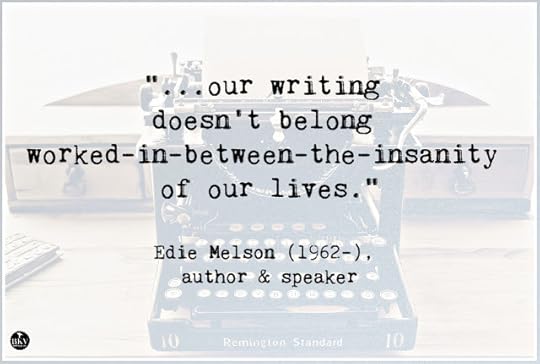
by Beth K. Vogt @BethVogt
Sometimes I read a blog post and think, “This is good. I’m going to want to read this again.”I save the post in my Evernote files, intending to reread the wise words sometime in the future.
Sometimes I do. Then there are times I don’t because I’m too busy writing and editing and just doing life. As the poet Robert Frost said, ““In three words I can sum up everything I've learned about life. It goes on.”
Earlier this week I came across a post by Edie Melson – yes, our Edie Melson – written just as 2019 was turning to 2020. It’s titled “Intentional Consistency: A Writer’s Best Plan for the New Year.”
Thinking back on what was happening when the blog posted on December 30, I’m sure I skimmed the headline and thought, “I need to read this, but I don’t have time.” Back then, one of my daughters was in the hospital. She’s fine now, but we were about to embark on a month of craziness.
Here it is the middle of March and I’ve just read Edie’s “let’s start the new year right” blog. And yes, it’s brilliant. (Aren’t all of Edie’s posts brilliant?)
Edie’s exhortation that our writing doesn’t belong “worked-in-between-the-insanity” of our lives challenged me.
Helloooo, Beth, are you paying attention?
It’s so easy to let anything and everything else rule our days. To say, “Life’s been so crazy lately,” and then explain all the reasons why we haven’t written.
Edie also listed eight ways she is intentionally consistent. Not perfect – consistent.
Let me define consistency so we’re all on the same page: marked by harmony, regularity, or steady continuity.
I like the eight-step game plan—hey, I’m one of Edie’s biggest fans—but her decision to respect her calling seemed to be underlined, written in bold letters, and highlighted. Here’s what Edie had to say:
“Through prayer and study, I’ve determined that God expects me to be obedient. I know, not a huge revelation, but just wait. That obedience isn’t supposed to only be in regard to the hard or the difficult things in my life. Obedience is foundational to everything. You see, I love writing and because it’s fun, I had developed the idea that it wasn’t important.”
I hear you loud and clear, Edie. Just because I like to write doesn’t mean it’s not important. And the truth is, I can’t ignore it on the hard days either.
Interested in intentional consistency? Check out Edie’s blog post. Have you read it already? I encourage you to read it again.
TWEETABLEHow Writers Grow Through Rereading - @BethVogt on @EdieMelson (Click to Tweet)
 Award-winning author Beth K. Vogt believes God’s best often waits behind the doors marked “Never.” Having authored nine contemporary romance novels and novellas, Beth's first women's fiction novel with Tyndale House Publishers, Things I Never Told You, released May 2018. Moments We Forget, book two in the Thatcher Sisters Series, releases May 2019. An established magazine writer and former editor of the leadership magazine for MOPS International, Beth blogs for Novel Rocket and The Write Conversation and also enjoys speaking to writers group and mentoring other writers. Visit Beth at bethvogt.com.
Award-winning author Beth K. Vogt believes God’s best often waits behind the doors marked “Never.” Having authored nine contemporary romance novels and novellas, Beth's first women's fiction novel with Tyndale House Publishers, Things I Never Told You, released May 2018. Moments We Forget, book two in the Thatcher Sisters Series, releases May 2019. An established magazine writer and former editor of the leadership magazine for MOPS International, Beth blogs for Novel Rocket and The Write Conversation and also enjoys speaking to writers group and mentoring other writers. Visit Beth at bethvogt.com.
Published on March 13, 2020 22:00
March 12, 2020
5 Ways to Honor God in Your Writing

by Joshua J. Masters @JoshuaJMasters
As a Christian writer, our first goal shouldn’t be a publishing contract or word count. Those are both important, but our priority should be to glorify God and draw closer to Him in our writing.Here are five ways to honor God in our writing careers:
1. Prioritize Prayer
It’s so easy for me to get caught up in the tasks and deadlines of writing. But when those things become a greater focus than my relationship with Christ, my productivity goes down. Worse still, I focus on what I want to say rather than what God wants to say through me.
We’ll never be able to represent the light of Christ if we’ve locked ourselves away from that light in our writing closet.
The time we spend writing is vital. It requires consistency and passion. But we must first have consistency and passion in our time with God if we want our writing to bear fruit.
Martin Luther was known to spend at least two hours a day in prayer. But on the eve of a busy day, Luther once said, “I have so much to do that I shall spend the first three hours in prayer.”
The more time we give to the Lord, the more He’ll bless the work He’s given us to do.
2. Seek Wisdom, Not Proof
There are many Christian writers (and if we’re honest, pastors) who search the Scriptures for Bible verses that support what they want to say rather than seeking what the Bible says and then deciding what to write.
We honor God by seeking His wisdom before we ever place our fingers on a keyboard. As we address biblical themes in our writing, we need to make sure we align our understanding of that topic with God’s before deciding a direction for our piece.
Have you ever struggled with forgiveness? That’s the kind of thing that prompts an engaging blog post, isn’t it? The problem is, our post is often more firmly rooted in our emotions than what Scripture says.
Before writing about forgiveness, we should remove our experience from the equation. Don’t worry, you can add it back in later. But set it aside long enough for an in-depth study of what Scripture says about forgiveness. Seek God’s perspective before you let your emotions taint the writing.
Once we really understand God’s perspective, we’re in a much better position to relay our experience in the light of God’s truth.
3. Context, Context, Context
If you write nonfiction, you probably go beyond using biblical themes and quote the Bible. John 1:1 tells us that Jesus is the word of God made flesh. So if we’re going to honor Him, we must honor Scripture. That means using His word in its full context.
Before using a verse in your work, explore the passages and chapters surrounding that verse, asking God to reveal its full meaning. How does it fit into the context of the entire book and Scripture as a whole?
Representing God’s word in our writing takes time and study beyond a Google search for keywords.
Many well-meaning writers have misled an entire generation on the meaning of popular Bible passages. The most obvious example is the common misuse of Philippians 4:13.
Can we do all things through Christ who gives us strength? Absolutely, but despite how it’s been portrayed in many books, the full context of this verse isn’t about the strength to achieve a goal. The passage is about finding contentment even in the face of failure. It’s a far more powerful verse than we give it credit for. It’s a promise that we can endure anything, not accomplish anything.
We can still glean strength and hope from these verses, but we honor God by understanding the full context of His word and representing it accurately.
4. Tithe Your Gift
Maybe it doesn’t have to be exactly 10% of the words we write, but imagine how much it would honor God and draw us closer to Him if we were intentional about giving a portion of our writing time back to Him every day.
Learn to sacrifice a portion of your writing to something that doesn’t advance your own career. If we’re grateful for the gift He’s given us, we should want to give some of it back to Him.()Write a private, daily prayer to God.Silently ask God what He wants to reveal to you. Then write what you sense He’s saying to you each day.Keep a gratitude journal.Write letters of encouragement to a missionary.Write anonymous notes of encouragement to others.Write private prayers of intercession for others.()
5. Write to an Audience of One
On the business side of writing, we need to consider our target audience.
And our secondary audience.And our tertiary audience.And I don’t think fourthiary is a word, but we probably need to consider that audience too.
But when we’re alone at our keyboard, our target audience should be God alone.
“Whatever you do, work at it with all your heart, as working for the Lord, not for human masters, since you know that you will receive an inheritance from the Lord as a reward. It is the Lord Christ you are serving” (Colossians 3:23-24 NIV).
When we focus on honoring God in preparing to write, how we write, and what we write, He will guide us to a deeper relationship with Him and use our writing to do the same for others.
How do you honor God in your writing?
TWEETABLE5 Ways to Honor God in Your Writing - @JoshuaJMasters on @EdieMelson (Click to Tweet)
 Joshua J. Masters is a pastor, author, and speaker. He’s been featured on CBN Television, HIS Radio, and the Light Radio Network. Josh is the author of American Psalms: Prayers for the Christian Patriot and is a contributing author for Feed Your Soul, Refresh Bible Study Magazine, and One Christian Voice. Josh has also worked as an actor and crew member in the film industry (SAG/AFTRA) and continues to have a passion for film. He lives with his wife, Gina, and Franklin the Pup outside Greenville, South Carolina where he serves as a speaking and care pastor.
Joshua J. Masters is a pastor, author, and speaker. He’s been featured on CBN Television, HIS Radio, and the Light Radio Network. Josh is the author of American Psalms: Prayers for the Christian Patriot and is a contributing author for Feed Your Soul, Refresh Bible Study Magazine, and One Christian Voice. Josh has also worked as an actor and crew member in the film industry (SAG/AFTRA) and continues to have a passion for film. He lives with his wife, Gina, and Franklin the Pup outside Greenville, South Carolina where he serves as a speaking and care pastor.Josh would love to connect with you on his website, www.joshuajmasters.com or engage with you on Facebook, Twitter, Instagram, or Goodreads.
Published on March 12, 2020 22:00
March 11, 2020
Writing the Rest of the Story
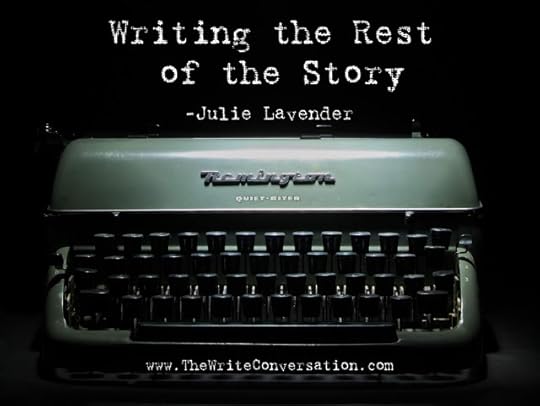
by Julie Lavender @JLavenderWrites
For more than three decades, he told “the rest of the story” on the airwaves of radio programs that reached millions of listeners every week. News broadcaster Paul Harvey delivered current event stories with a flair like no other, inserting dramatic pauses and intonations and his own quirky sense of humor. I’ll admit that I wasn’t, as a high school and college student, always interested in his news posts, but I adored his “rest of the story” segments. I loved hearing the lesser-known stories, the tidbits that most likely wouldn’t make the headline news that evening nor the front page the next morning.
The stories of just the average Joe or the normal Nan. They were powerful stories that I could relate to—I was a poor farmer’s daughter; I couldn’t relate to the latest Hollywood story, the wealthy entrepreneur, or the politicians in D.C. Perhaps Harvey’s influence fueled my love of sharing others’ stories through newspaper or other articles.
The stories that might not otherwise make the front page of my hometown newspaper, with a staff that’s been cut more and more over the years. Poignant stories that might not find their way to print without a little help from writers willing to share the rest of the story.
This week, I found out that stories I’ve shared of other people in various media were chosen as Selah Finalists in the Blue Ridge Mountains Christian Writers Conference category of “articles in print.” I am humbled and thrilled to know that the God-stories I wrote, those “lesser-known stories” in my hometown, were selected alongside distinguished works of art in the category.
If you’ll permit me, I’d love to share “the rest of the story” of some of those Selah Finalists’ articles that I’ve had the privilege to share in print.
 “Determined Teen Follows Her Dream,” Statesboro Herald Newspaper, is the story of a 15-year-old double amputee who, with the help of some “angels” as her mama called them, received a new pair of prosthetics and therapy at no cost, giving her mobility that she had not had since the age of five, when she lost both legs due to a rare disease.
“Determined Teen Follows Her Dream,” Statesboro Herald Newspaper, is the story of a 15-year-old double amputee who, with the help of some “angels” as her mama called them, received a new pair of prosthetics and therapy at no cost, giving her mobility that she had not had since the age of five, when she lost both legs due to a rare disease.“God put just the right people in our lives at the right time,” I quoted Tazmeria’s mother.
With the help of these “angels,” Tazmeria is following her desire to play golf, a dream she’s had since she was just a little girl.
And now, my community knows the rest of the story of a determined teen and some kind-hearted adults who work pro-bono to give the dreamer a better life.
“D’s Friendly Diner,” Guideposts Magazine, is the story of a remarkable woman who overcame the stronghold of years of drug use and alcoholism, who worked at McDonald’s after getting sober. Dana walked to work every day, from the rehab house where she lived, and each day, for weeks, she stopped at a small diner to see if the owner would hire her. After months of asking, Dana was finally told yes.
Dana’s hardworking ethics and transparency with the customers endeared her to so many, that when she made plans to buy the diner from the retiring owner, a couple that frequented the breakfast spot co-signed for her loan.
She started with one cook and one waitress—herself. Now, she has almost a dozen workers, and all but two workers are in various stages of recovery.
Dana said, “Drugs did so much damage in my life and in my family’s life. I can’t undo that. What I can do is trust God and give others the love and support that were so crucial to my own recovery.”
And now, more than a million Guideposts subscribers know the rest of the story of how God is using a former drug-addict to change the lives of others who struggle with addictions of their own.
Dana proudly hung a framed copy of the Guideposts article that tells her story on the diner wall, along with hundreds of photographs of customers who each have addiction stories they’ve shared with Dana over the years.
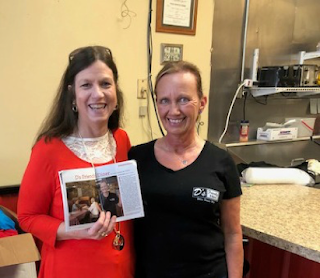 “Volunteers Serve the Community at the Averitt,” Discovering Bulloch Magazine, is a recovery story of sorts, as well, that tells the partnership of the community theater in my hometown with volunteers who are earning service hours as part of their rehab experience. It’s a beautiful, win-win relationship that has changed the course of young men and women who, not only couldn’t find jobs, but couldn’t find purpose in life, either.
“Volunteers Serve the Community at the Averitt,” Discovering Bulloch Magazine, is a recovery story of sorts, as well, that tells the partnership of the community theater in my hometown with volunteers who are earning service hours as part of their rehab experience. It’s a beautiful, win-win relationship that has changed the course of young men and women who, not only couldn’t find jobs, but couldn’t find purpose in life, either. I quoted one young man who said, “Willingway got me sober; the Averitt Center gave me a chance that others might not have. They allowed me to get outside myself and help other people.”
And now, the arts community in my county knows the rest of the story behind the volunteers that helped turn around, and possibly save, the local theater program.
“Christmas Card Creations,” cover story of Clubhouse Magazine, shares the story of an 11-year-old youngster with a passion for drawing. Harrison draws Christmas cards each year to sell to friends and family and a huge portion of his profits go to a different charity each year. He got the idea the first year he drew a card at seven, when he wanted to give the money to his aunt and uncle to use for the medical expenses of his three-month-old cousin, Kate, who had just been diagnosed with lissencephaly.
The kids’ magazine article quotes Harrison, “My parents taught me about saving money and about giving back to others,” and continues with “Harrison loved the idea of using his talents for Christ and giving back to God.”
And now, the readership of Focus on the Family’s Clubhouse Magazine know the rest of the story of a youngster who wants to use the talents God gave him to serve the Lord and bless others.
 I never tire of telling God-stories and happenings from my community, and I count it a joy and privilege to do so. I also never tire of encouraging others to find some of those “lesser-known,” but great in God’s Kingdom, stories to share, too. Not only is it rewarding to write newspaper and magazine articles, to share those God-stories with others, but it’s a great way to earn writing credits while you’re penning larger pieces of work and building platform.
I never tire of telling God-stories and happenings from my community, and I count it a joy and privilege to do so. I also never tire of encouraging others to find some of those “lesser-known,” but great in God’s Kingdom, stories to share, too. Not only is it rewarding to write newspaper and magazine articles, to share those God-stories with others, but it’s a great way to earn writing credits while you’re penning larger pieces of work and building platform.I’d love to hear some of your “rest of the story” stories. Share with me, won’t you?
Julie Lavender ……Good day. (That’s a little Paul Harvey humor there …. in case you’re wondering.)
TWEETABLEWriting the Rest of the Story - @JLavenderWrites on @EdieMelson (Click to Tweet)
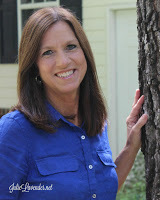 Though Julie Lavender is thrilled that several of her articles in print were chosen for Selah Finalist awards, she’s most happy that the God-stories in each of those articles is being shared with many. She counts it pure joy that God gives her the opportunity to share in various ways what he is doing in her small, south-Georgia town. Julie is also excited that her parenting book, 365 Ways to Love Your Child: Turning Little Moments into Lasting Memories, published by Revell, releases in October of this year. She thanks God for the opportunity to offer “make a memory” suggestions, and she looks forward to hearing memory-making ideas from others on her Facebook page, 365 Ways to Love a Child. Connect with Julie there – she’d love to meet you!
Though Julie Lavender is thrilled that several of her articles in print were chosen for Selah Finalist awards, she’s most happy that the God-stories in each of those articles is being shared with many. She counts it pure joy that God gives her the opportunity to share in various ways what he is doing in her small, south-Georgia town. Julie is also excited that her parenting book, 365 Ways to Love Your Child: Turning Little Moments into Lasting Memories, published by Revell, releases in October of this year. She thanks God for the opportunity to offer “make a memory” suggestions, and she looks forward to hearing memory-making ideas from others on her Facebook page, 365 Ways to Love a Child. Connect with Julie there – she’d love to meet you!
Published on March 11, 2020 22:00
March 10, 2020
7 Benefits of Writing Articles

by Linda Gilden @LindaGilden
As I step back into the writing business after almost a year away, my mind immediately went to my favorite kind of writing—articles. Just in the last couple of weeks, I have written and submitted over half a dozen articles. I am rediscovering the fun of writing for publication.I am always shocked when I mention writing articles at writers conferences and many say, “I never really thought about writing articles!” Never thought about writing articles?
Really? I cut my writing teeth on articles almost 30 years ago and have loved writing articles ever since. At the time my reason for choosing to write articles was influenced by my three young children who didn’t like to nap. Therefore, my writing time was limited to after bedtime and by that time I was so exhausted that I didn’t have enough energy for more than a few words.
But there are many excellent reasons to write articles other than they are short and you can finish one in a short sitting or during naptime (if you can get your children to take them).
Reasons to Write ArticlesArticles will help you build your platform. New writers especially need to get their names in print. But even experienced writers can broaden their platforms and expand name recognition by writing articles. Research that you do for one article can be used to write other articles on the same subject. Just make sure you submit to different publications and, unless submitting as a reprint, your article has a different slant and focus. Articles reach more people than books. Unless you are a New York Times bestseller, your articles will reach far more people than your books. Articles are a great way to market your books. Writing articles about the subject of your book or an issue in your book continues to establish you as an expert on that subject and offers the opportunity to include a plug for your book in your bio.Articles will help you hone your craft and learn how to write tightly—to make every word count. Many authors are able to make more money writing articles than books. When you calculate the time it takes to write articles vs books and look at the amount you are paid for articles, you may find that your article payment is far more than your royalties. That is, unless again, you hit the bestseller list.Articles change lives. You can teach your readers how to do something new, impart new information, inspire others to solve a problem or overcome an obstacle, or point them in a new way to build their faith.
Writing articles, can be beneficial to writers in many different ways. If you have never written articles, perhaps today would be a good day to start. If you need help, you can learn how to write articles later this month at the Carolina Christian Writers Conference.
TWEETABLE7 Benefits of Writing Articles - @LindaGilden on @EdieMelson (Click to Tweet)
 Linda Gilden has been writing articles for over three decades, or as her children would say, “Since the 1900s!” She is the author of Articles, Articles, Articles! loves helping people learn about the process as an article writing coach. www.lindagilden.com
Linda Gilden has been writing articles for over three decades, or as her children would say, “Since the 1900s!” She is the author of Articles, Articles, Articles! loves helping people learn about the process as an article writing coach. www.lindagilden.com
Published on March 10, 2020 22:00
March 9, 2020
Guarding the Integrity of the Writer

by Cindy Sproles @CindyDevoted
We live in a judgmental world. These days, integrity is, well. . . defining.
When my boys were in high school it was fun to watch the expression on their faces when I knew what went on at school before they got home. The truth is, people do not live to share the joys of your children, rather they rush to tell you all the unpleasant things. Sad as it is, the news is always hidden under a ruse like, “So and so was caught doing this at school. Don’t your boys hang out with him because today…”Whether you choose to write in the general market or the Christian market, the level of integrity you set for yourself is vital. It’s equally important you don’t walk blindly into any industry assuming you can speak one thing and do another. Your hand will be called and when it is, it’s ugly.
The words you place on the page will, and do, affect others. There are times they may place you on a pedestal, even times they will call you out. Either way, we cannot change the fact that when writers pen words, others will take them to heart, so if a reader sees your physical actions opposite of your written actions and beliefs, there can be major repercussion.
I am not here to set your personal standards for you but I am here to guide you in the integrity of your writing career. With one slip, you can quickly lose the respect of your readers because, again, people never seek out the good in us – they seek out what can tear us down.
There are things that will help you maintain your integrity in the writing world.
Guard Your IntegrityVerify your information: Always verify the information you write. Practice the 3 count rule. Seek out three reputable sources and then sprinkle that with even more. You can never be too careful when it comes to writing accurately. Be fair: When you write always be fair, even if it is something you highly oppose. Remember your fairness, even in controversy, speaks volumes.Check the rules: Always, ALWAYS, check the rules of the conferences and venues you attend. Many Christian conferences and venues are 100% non-smoking and alcohol free. Do yourself a favor and check those rules before you attend and do not endanger the conference or those leading it by bringing alcoholic beverages, drugs, or smoking into the venue or conference that may state otherwise..Always tell the truth: Be truthful even when it’s the unpopular thing. It may be hard at the time but you will never regret that decision.Do what you say: If you tell someone you will do something—then do it. It’s easy to forget, especially at a conference, and if you are afraid you will forget, have the conferee email you after the conference. Especially for faculty, when conferees are tossing questions and asking for your time and information, it is very easy to misplace something or forget. Simply give your business card and ask them to email you after the conference, then follow through.Police what you say: It’s easy to grow frustrated in your writing or at a conference. Police your words by quieting the desire to complain or share rumors. If there is an issue, quietly talk to the conference director, but don’t make issues a “big deal” to your writing peers. Direct comments to the appropriate people in charge and don’t stir up chaos.Do not put yourself in any compromising situation: With the world focused on the “Me Too” movement take precautions to never place yourself in a situation that could turn south. I’d like to say that the Christian world is not affected by this issue but it is. It’s important to remember, Christians fall to temptation and sin too. Don’t raise others to a higher pedestal than the One who created us. Use common sense and don’t let your desire for success rest on a threat. If you are being pressed to be or do something immoral, then RUN. It’s a wolf in sheep’s clothing. Don’t place yourself in a compromising situation with anyone. If you must meet with someone of the opposite sex, be sure you are in public places and not alone. Integrity flows both directions—you should not be asked to put yourself in a situation that is potentially unsafe and you should not accept.Do your homework: When you are ready to promote your work to readers, use caution with whomever may offer their services. Do your homework. Check the readership or views of those claiming to have huge platforms. It would be nice to say you can take someone at their word, but these days, there are many who take advantage of writers. Do your homework. Ask for references, Google reviews. This is good stewardship and wise. From editors, publishers, and promoters – be vigilant to verify information.
Setting the pace for your integrity is never a mistake, rather it will provide a beacon in the darkness. When that still small voice speaks to you, listen. Always be a writer of integrity.
TWEETABLEGuarding the Integrity of the Writer - @CindyDevoted on @EdieMelson (Click to Tweet)
 Cindy K. Sproles is an author, speaker, and conference teacher. She is the cofounder of ChristianDevotions.us and the executive editor of ChristianDevotions.us and InspireaFire.com. Cindy is the managing editor for Straight Street Books and SonRise Devotionals, both imprints of Lighthouse Publishing of the Carolinas. She is an award-winning and best-selling author and the director of the Asheville Christian Writers Conference. Visit Cindy at
www.cindysproles.com
. @cindydevoted
Cindy K. Sproles is an author, speaker, and conference teacher. She is the cofounder of ChristianDevotions.us and the executive editor of ChristianDevotions.us and InspireaFire.com. Cindy is the managing editor for Straight Street Books and SonRise Devotionals, both imprints of Lighthouse Publishing of the Carolinas. She is an award-winning and best-selling author and the director of the Asheville Christian Writers Conference. Visit Cindy at
www.cindysproles.com
. @cindydevoted
Published on March 09, 2020 22:00



